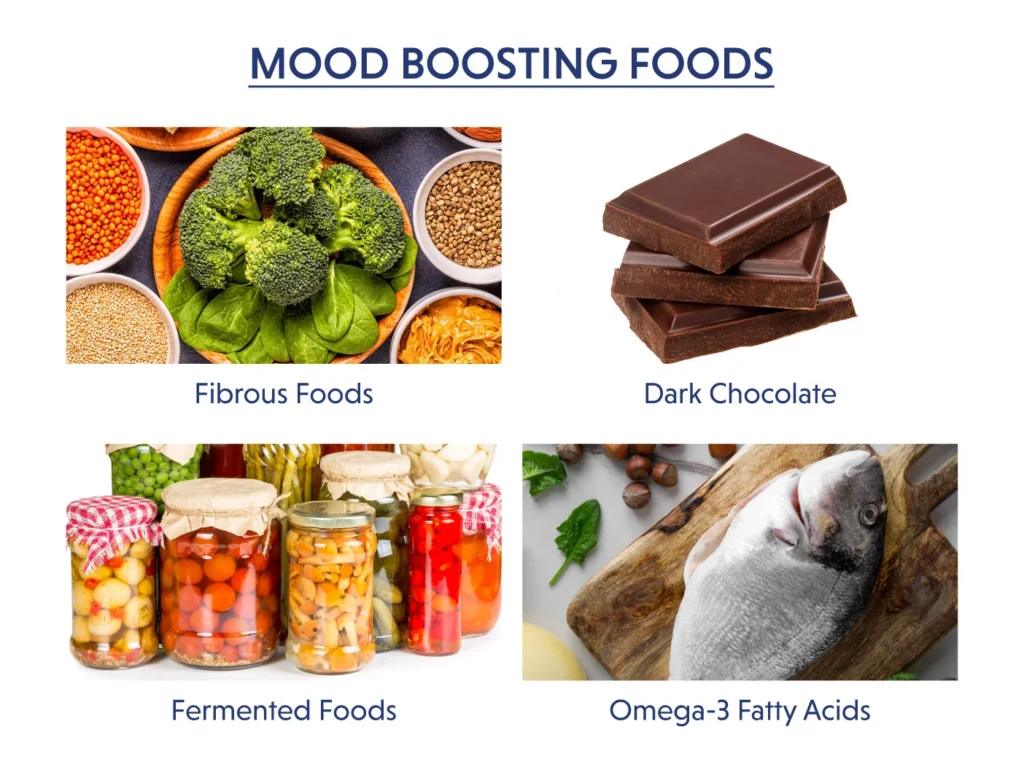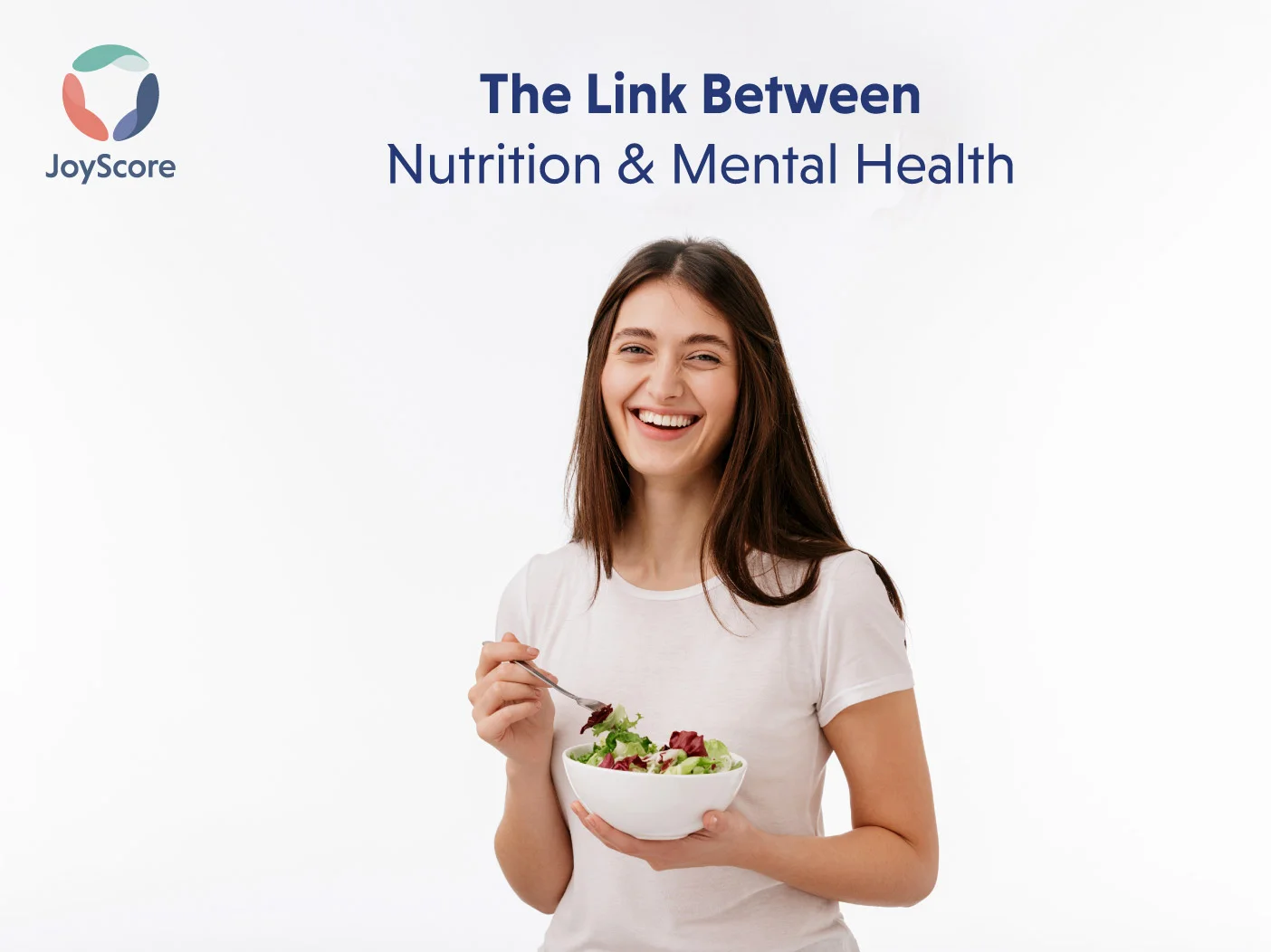DIET AND MOOD
Without a steady and healthy source of fuel from the foods you eat, your mind and body can not function well. You need to include a variety of foods in your diet plan and understand their role in boosting your performance in daily activities.
It is important to know which foods lower your energy and mood. It’s a good idea to keep track of the foods you eat and strive to eat an action-packed diet full of vitamins and minerals as this helps manage your mood.
The relationship between food and mental health is so strong that it affects the way the brain works and can even contribute to brain disorders like depression. Mood-boosting foods improve the formation of neurons that are responsible for proper thinking, attention, and memory. Thereafter, you feel happy and confident.
GUT-BRAIN AXIS
As the name indicates, it is an axis or link connecting the centers of the brain with peripheral intestinal functions. This means that every change going on in a person’s stomach will directly affect his state of mind. The gut-brain axis is a two-way signal and a poor mental state will result in unhealthy gut makeup and function.
Diet is the simplest way of altering the type of bacteria in the gut to further improve brain health. Different species of gut bacteria are responsible for producing different hormones like serotonin and GABA. Wherein, serotonin is involved in mood and sleep; and GABA (gamma-aminobutyric acid) reduces stress, anxiety, and fear. Therefore, learning about foods that can improve your gut bacterial community becomes important.
As the saying goes, “It is hard to stay in a good mood when you are hungry.” But eating anything and everything will not help. This calls for a detailed discussion on food groups categorized under mood-boosting foods along with those that negatively affect our mood.
MOOD-BOOSTING FOODS

- Include more Omega-3 fatty acids
Researchers have noted the role of omega-3 polyunsaturated fatty acids as mood stabilizers for the brain. Omega-3s contribute to the fluidity of the brain’s cell membrane improving brain development and cell signaling. Eating these groups of essential fats is necessary as they can’t be produced on their own in your body. So, they need to be consumed in adequate amounts, in the form of plant or animal foods. Although there is no standard dose, most adults are advised to get at least 250-500 mg of EPA and DHA daily. Rich sources of omega-3s are basil seed drinks, walnut, flax seeds, salmon fish, seaweed, Brussels sprouts, spinach, and broccoli.
- Fermented foods
Whenever a food product undergoes the process of fermentation, it allows live bacteria called probiotics to thrive. These beneficial bacteria help convert sugars in food to alcohol and acids, promoting the release of serotonin or happy hormone. Serotonin thereafter, affects human behavior such as mood, stress, appetite, and sexual drive in a healthy way. Some probiotic rich foods are kimchi, kombucha, yogurt, kefir and sauerkraut.
- Dark chocolate
Low in sugar and fats, dark chocolate is a better choice than milk chocolate. Take note that 1-2 small squares of a dark chocolate bar is more than enough to promote a good mood because of their high-calorie content. Dark chocolate stimulates the release of a cascade of feel-good compounds such as caffeine, theobromine, and N-acylethanolamine, which are linked with an uplifted mood. It can also increase the blood flow to the brain and reduce inflammation.
- Fibrous foods
Fiber-rich foods slow down the release of sugar into the bloodstream. This allows for stable blood sugar levels and better mood control. Eating about 1.5-6 grams of fiber at breakfast attributes to the control of mood swings and irritability throughout the day.
They are also a rich source of antioxidants and play a key role in combating inflammation which is associated with depression and other mood disorders.
Fibrous foods are also rich sources of B vitamins that can promote mood with the help of neurotransmitters like serotonin, dopamine, norepinephrine, and GABA. Deficiency of these vitamins particularly B12 and folate, have been linked to mood disorders like depression. Hence, fibers are a good example to prove the food and mental health connection.
Zinc, magnesium, selenium, and non-heme iron are other important compounds found in fibrous foods.
FOODS HAMPERING YOUR MOOD
- Sugary beverages
If you crave a soda, this is important for you. These sugar-sweetened beverages have the blood-spiking sugar of fruit juices with no nutritional value. A sudden rise in sugar levels will be followed by a sudden decline, leaving you in a bad mood with disturbed sleep.
Beverages like coffee, tea, and Coke are high in caffeine also and act as a stimulant. While it makes you feel energized, it can also disturb your sleep cycle. Improper sleep and reduced absorption of mood-regulating vitamins will result in a bad mood. Instead take herbal teas like peppermint, lavender, or lemon balm.
- Processed foods
Processing involves high levels of added sugars, salt, and unhealthy fats again leading to mood swings and irritability. So nowadays, they are the leading cause of inflammation in the body and brain. In totality, processed foods contribute to mood disorders like anxiety and depression. However, they form a major part of the diet for many. A cup of coffee instead of breakfast or a pint of ice cream to replace your dinner is not how we should be eating.
- Alcohol
Occasional drinking is not considered bad for many, but it is important to note that it is a central nervous system depressant. Therefore, you tend to feel exhausted and tired after consumption making you even more depressed.
CONCLUSION
Based on a number of researches to support the gut-brain connection, it is safe to say that food and mental health are co-related. Although a healthy diet is not a cure for mental health conditions, it can certainly reduce the risk factor.
Download the JOYSCORE app to boost your happiness and health.
Download on the Appstore
Get it on Google Play



